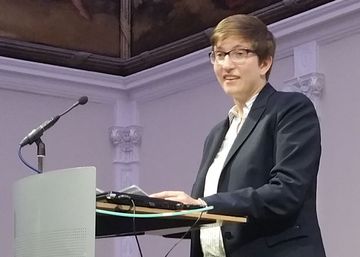Copyright exception gymnastics

"National sovereignty in a globalized world is an illusion, and a dangerous one at that," the MEP Julia Reda said last Friday morning, a few hours after the results of Britain's EU referendum had been announced.. She might have said this anyway in the interests of explaining why copyright reform is so difficult to achieve, but it had, as I'm sure she intended it to, special poignance for a shaken-up audience asking each other what had just happened.
Reda was speaking at the Create Festival, a day-long event intended to show off the work of the many researchers aiming to put an evidence base underneath copyright policy. In her talk, she stressed two things: first, the need to take a more coherent approach than the patchwork of exceptions that solve symptomatic problems one by one but never add up to a cure for the underlying problem; second, that no country can make copyright policy on its own. Probably everyone in the audience - and one speaker who had to dig out his handkerchief when he began to talk about Europe - knew that last point already.
The push toward harmonization has not in general been kind to copyright reformers. Because so much is subject to international treaties, governments have much less control over laws at the national level and what those laws say is far less democratically accountable. This is especially true as these treaties have changed in character. Earlier intellectual property agreements - beginning with the 1886 Berne Convention - focused specifically on intellectual property. Granted, the participants in the discussion tended to be limited to specialists working for either governments or large rights holders. Today's treaties, like the Trans Pacific Partnership are monster affairs of which intellectual property is just one piece.
Britain can't realistically break ranks with any of that. As Reda put it, "The future of copyright will not lie with those who will simply try to leave the international system of compromises that have been struck." The international collaboration the internet enables would be a bureaucratic nightmare in a world where every nation's individual laws had to be separately navigated.
Reda argued that the problems of lack of harmonization dwarf the other problem she highlighted, but the questions she raised around temporary copies are nonetheless much more interesting. Twenty years ago, at the beginning of the commercial web, the question of whether temporary copies should be legal was a big issue. In the analog world, all copies were permanent copies, and so all copies required payment. There was no such thing as a temporary copy; perhaps the closest to such a thing arrived with photocopiers, where you could make a copy at a modest enough cost that you might toss it when you were done with it.
It is impossible, however, to browse the web without making a temporary copy of the page you're looking at in your computer's memory. Therefore, incredible as it seems now, there was some debate about whether this should be allowed. In 2001, an exception to copyright law for transient or incidental copying as part of network transmission or legal use was included in the EU Copyright Directive. This exception makes all sorts of digital technologies possible that weren't conceived of at the time: for example, it makes it legal (in Reda's example) for people with cochlear implants to listen to music via the digital signal processor inside, and it also lies behind the EU court's ruling in 2014 that watching pirated broadcast streams is legal.
The point of this discussion of what Reda called "copyright exception gymnastics" was to highlight a proposal under discussion to create an exception for text and data mining. To Reda, this is the same basic problem mutatis mutandis; you're not extracting and copying the data for its own sake but as a transitional step to analyzing the data to learn from the results. So, Reda asked, rather than keep making exceptions for the same purpose, shouldn't we reform the exclusive reproduction right?
 What's so striking about Reda's point is the number of ways copyright can invade the physical world alongside the software and computer systems that are rapidly being embedded everywhere. We've talked about the Internet of Things and 3D printing, but Reda is the first person I've seen to see a connection between freedom of panorama and the images captured by CCTV cameras. Arguing that retaining such images violates the reproduction right would be an interesting way to campaign against surveillance - but, as Reda says, is copyright the tool you want to use for that purpose? Will new exceptions be needed for sensors, VR googles, and enhanced headphones, all of which create copies of inputs in order to process them?
What's so striking about Reda's point is the number of ways copyright can invade the physical world alongside the software and computer systems that are rapidly being embedded everywhere. We've talked about the Internet of Things and 3D printing, but Reda is the first person I've seen to see a connection between freedom of panorama and the images captured by CCTV cameras. Arguing that retaining such images violates the reproduction right would be an interesting way to campaign against surveillance - but, as Reda says, is copyright the tool you want to use for that purpose? Will new exceptions be needed for sensors, VR googles, and enhanced headphones, all of which create copies of inputs in order to process them?
"The mere perception of the world around us was never supposed to be covered by copyright. But this is exactly what the equation of digital copies with analogue copies achieves."
Reda is right to argue that change of the kind that's needed is not going to happen without wide collaboration and that it must incorporate the impact on developing nations. A global problem will require global solutions. Independence isn't what it used to be.
Wendy M. Grossman is the 2013 winner of the Enigma Award. Her Web site has an extensive archive of her books, articles, and music, and an archive of earlier columns in this series. Stories about the border wars between cyberspace and real life are posted occasionally during the week at the net.wars Pinboard - or follow on Twitter.